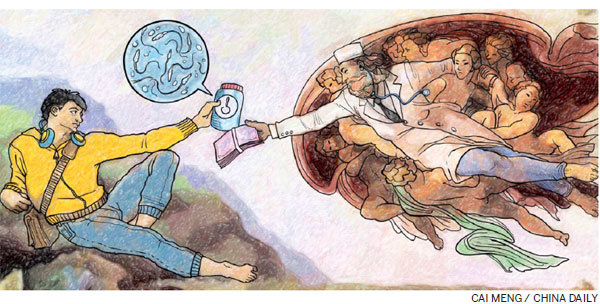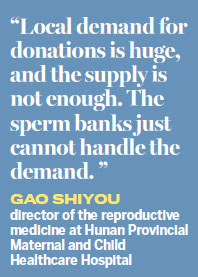Appeals to attract sperm donors
Updated: 2016-01-08 07:56
By Chen Mengwei(China Daily Europe)
|
|||||||||||

Clinics across China are offering cash incentives to boost interest among young men
Financial incentives and online campaigns are helping to ease the stigma attached to sperm donation in China, offering hope to couples struggling to conceive.
The nation's first sperm bank was opened almost three decades ago. Many more have followed nationwide, but the number of donors has remained low.
To solve the problem, Beijing University No 3 Hospital recently posted an appeal on WeChat, the instant-messaging app. It started with "Guys, want a date?" and went on to offer 5,000 yuan ($760; 703 euros) for a donation.
The post attracted 85,000 views in two weeks and was one of the most discussed topics, especially among students.
Liu, 22, a student at Beijing Sports University, who declined to give his full name, decided to the answer the appeal. "Why? Because it's a lot of money - 5,000 yuan," he says.
When he did call the hospital, however, he was told they already had enough volunteers and told him to instead contact the Human Sperm Bank, a similar facility in Beijing that is run by the National Research Institute for Family Planning.
Liu's classmate, Bai, also went along. He says his girlfriend did not like the idea of his donating sperm at first, as she was worried it would harm his health and affect their sex life. "I told her it was a worthy cause and would help couples or single women who are unable to have children," he says.
In the end, neither Liu nor Bai's donation could be used, as the samples were not suitable for storage in extremely low temperatures.

Jack Ma, the founder of Alibaba, also launched an online campaign in July for more sperm donors, posting an appeal on the company's Taobao e-commerce website. He also promised to pay up to 5,000 yuan to qualified donors. More than 22,000 men signed up within three days.
Official data show sperm banks in Beijing, Shanghai, Guangzhou and other provinces are facing severe shortages due to rising demand.
In China, sperm donation is strictly regulated. By 2012, only half of the mainland's 31 provinces, autonomous regions and municipalities had sperm banks. Several local clinics have been set up since then, but the number is still insufficient to cover the entire country.
Liang Xiaowei, director of the Human Sperm Bank, says despite the large number of respondents, the Alibaba campaign did not result in many donations.
The e-commerce giant passed on the contact details of more than 5,000 potential donors, to whom the Beijing clinic sent texts and e-mails and offered free health checks. Fewer than 20 men actually visited the clinic, and most were only interested in a checkup, Liang says.
The Human Sperm Bank, which received a government certification in 2015, was the only one of its kind in the capital until the Beijing University No 3 Hospital opened a bank this year.
Liang says her clinic receives about 1,000 volunteers a year, but only the sperm from about 100 can be stored. Part of the problem lies in the higher than average standards. Besides being medically healthy, a donor's sperm must be able to withstand a temperature of -196 C.
In 2015, the sum offered for donations was increased from 2,000 yuan to 5,000 yuan to stimulate interest. "We raised the standard because other regions did so. Beijing should not lag behind other provinces. Our donors deserve better compensation," Liang says.
Qualified donors can receive the full amount only if they can deposit 40 tubes of sperm - more than 20 milliliters - over a two-month period. Depending on the man's condition, this could take six to 12 donations.
Parental concern
While the online appeals may have promised financial rewards for donors, they offer hope to many childless couples. Yet many do not see donated sperm as an option.
Candy, 34, has been married for five years and is desperate to have a child. However, doctors say her husband's sperm has low vitality, which has resulted in the inability to conceive.
The couple has tried every means to solve the problem, including surgery, traditional Chinese medicine and advanced in vitro fertilization. So far, they have spent about 300,000 yuan but have nothing to show for it.
Candy, who is Chinese but used an English name to protect her identity, says her husband and in-laws have been supportive. She is strongly opposed to using a sperm donor, and says she will look at adopting if she is still childless in 10 years.
She is concerned about the risk of incest from using unknown sperm, which according to online polls by the Human Sperm Bank is one of the major reasons why people are hesitant about sperm donation.
Not only do donors and recipients worry about this, but also regulators. In China, the government has implemented strict regulations, including a rule that states sperm from an individual donor can be used to fertilize eggs from only five women.
Liang says that given the huge population, the restriction statistically minimizes the chance of a donor's biological children having intercourse with one another.
"The calculation is correct. The probability will be much lower than (the overall chance) of unintentional incest," she says. "Even if we lift the limit to eight to 10 women, the chances will still be lower than average."
Calculations aside, there are at least two challenges here. One, as the donors and recipients are strictly prohibited from knowing each other, it is virtually impossible to prevent biological siblings from getting married, should they meet and fall in love.
Liang says her sperm bank keeps records on the whereabouts of donors' sperm for 70 years. Each child produced from this sperm bank also gets a unique identification number, which is kept confidential.
However, in reality, most parents who receive a sperm donation tend to keep the process secret, especially from their children. Liang says her clinic has never received a request to see these records in the past decade.
The second challenge is how to ensure a donor's sperm is used in different regions, rather than in one city. The latter situation would statistically increase the probability of a donor's offspring running into each other.
Gao Shiyou, director of the reproductive medicine at Hunan Provincial Maternal and Child Healthcare Hospital, says most sperm banks are established under large hospitals and get most of the supplies.
"We all know the farther and wider we deliver a donor's sperm, the better it is," he says. "But the reality is, local demand for donations is huge, and the supply is not enough. The sperm banks just cannot handle the demand."
There is no law or regulation that forces hospitals to diversify the recipients, but Gao believes clinics should reach a consensus to share a fixed proportion of their donations with other regions.
"The larger the population base, the safer it is," he adds.
chenmengwei@chinadaily.com.cn
Today's Top News
Going mobile
Wealth of options for China's super-rich
Man with knife shot dead outside Paris police station
Trading halted after shares fall 7% in opening minutes
China voices its 'resolute opposition' to DPRK test
Design exhibition to attract Chinese art works
Germans shaken by mass attacks on women
Concerns grow over Saudi-Iranian rising tensions
Hot Topics
Lunar probe , China growth forecasts, Emission rules get tougher, China seen through 'colored lens', International board,
Editor's Picks

|

|

|

|

|

|






